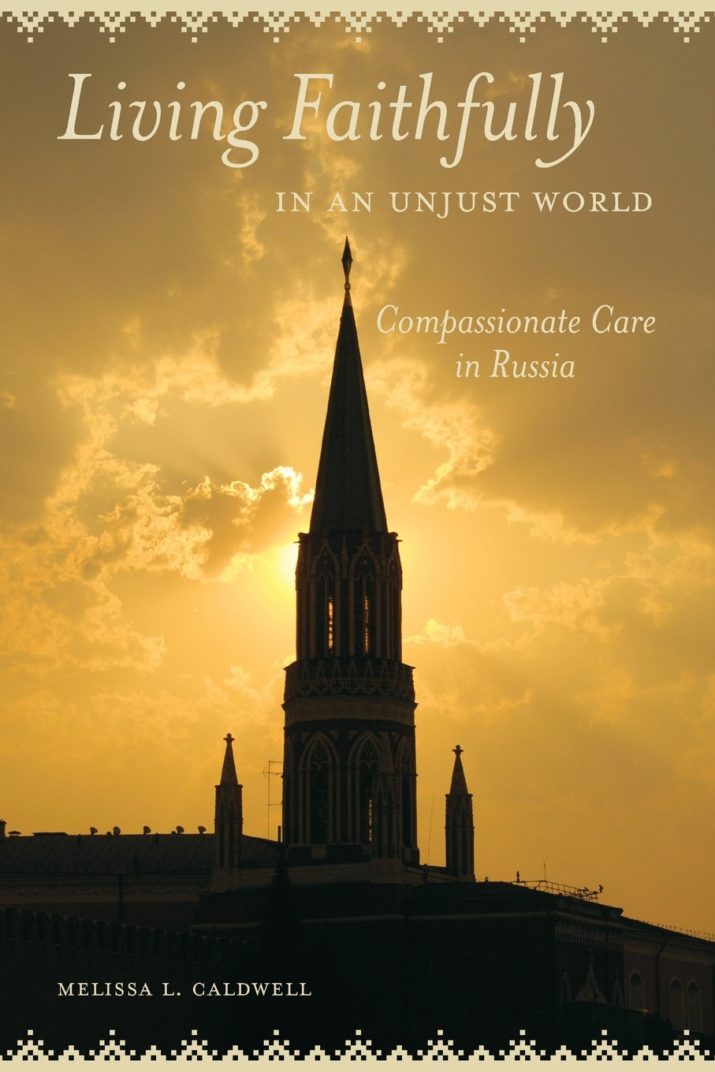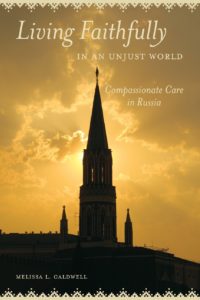

Social and economic precarity, anomie, abandonment, dispossession and displacement—these, unfortunately, are hallmarks of our times. How, then, do ordinary people seek to make a difference in the lives of others? Moreover, what do such practices look like in Russia, a postsocialist place currently living under Putinism? Melissa Caldwell’s Living Faithfully in an Unjust World addresses these questions through a study of Russia’s so-called “Third Sector”—a term that refers to the various NGOs that have emerged between the state and the market following the Soviet collapse. Caldwell takes readers into the world of Moscow-based volunteerism, documenting a vital spirit of compassion and mercy that thrives beneath the Kremlin-focused headlines of the Western press.
Since the collapse of the Soviet Union, a number of other anthropologists—Julie Hemment (2004; 2007) and Janine Wedel (1998) to name two—have focused on tracking the Third Sector in Russia and what it says about emergent forms of citizenship and activism under postsocialist neoliberal conditions. What makes Caldwell’s book noteworthy is not just its impressive and wide-ranging scope (she draws on over twenty years of research in a dozen organizations), but also its engagement with faith-based, rather than secular, organizations. Caritas, Catholic Charities, Lutheran World Relief, to some degree Aga Khan—these are a few of those that Caldwell discusses. As such, Caldwell fills an important gap in the literature, while also offering readers a grounded, and fascinating window onto the forms that faith-based volunteerism has taken since the collapse of the avowedly secular Soviet state, and the rise of Russian Orthodoxy.
The question she asks in this book is a pressing one: how do the actors involved in these organizations—a combination of Russians and non-Russians—express compassion? She discovers a diverse and, at points, moving set of practices. She argues that these groups are collectively seeking to construct a form of “civility” that will provide an alternative to the discourse of “civil society” that was promoted in Russia by neoliberal-democratic reformers in the 1990s. Their alternative is guided not by a postsocialist interest rule of law, markets, elections, and consumer citizenship, but rather by what Caldwell terms a “universalist humanism” oriented by the respective faith-commitments of these groups.
Living Faithfully anchors its claims in a series of concrete encounters. Caldwell accompanies volunteers on the rounds, for example stopping with two women who have established a relationship with a homeless woman who lives on a stretch of Moscow sidewalk. She pays special attention to intimate kinds of sociality that emerge in these ordinary interactions, and how they also foster volunteers’ own efforts at personal moral fulfillment. Caldwell also takes readers into high-level international inter-faith conferences where the terms of compassion and care are discussed explicitly. She works alongside volunteers in food distribution, showing some of the kinds of negotiations that go into deciding what kinds of donations to accept. And she works with organization leaders, describing their efforts to determine the appropriate kinds of appeals to potential donors. The result is a plurality of perspectives on care and volunteering centered on the reflections that the people involved have about their efforts.
One intervention this book seeks to make is in the broader anthropology of care that has emerged in studies of humanitarianism. Specifically, Caldwell turns away from analyses explicitly engaged with the ways in which compassion, care and even “social justice” are always-already framed by structural factors such as neoliberal policies. Instead, Caldwell focuses much more squarely on the sense that these volunteers, pastors, and organization employees have to “do good” in the world through the provision of compassion, generosity, and love. Caldwell notes in the preface, “Less visible [to outside observers of Russia] are acts of care and concern that happen in daily life, both spontaneously and formally through organized projects” (xi). As such, this is a book that provides a ground-level view of care and assistance. For those readers who may be frustrated with the dire formulations of the anthropology of humanitarianism, Caldwell’s book may provide a welcome alternative.
Living Faithfully is certainly attentive to the trenchant critiques of care and humanitarianism. The author notes, for example, Andrea Muehlebach’s (2012) observation that care work can often unwittingly fill the void left by a neoliberalizing state, as well as Vincanne Adams’ (2013) point about the way that affect economies of compassion can also fuel profits. Caldwell’s chapter on the “Business of Being Kind,” as well as a final chapter on “Deficits of Generosity,” both outline how faith-based organizations invariably can become ensnared in the commodification of care, as well as the possible perpetuation of social inequality through this work. Various organizations must sometimes turn to a crude form of commodification—care trinkets and other items—in order to stay afloat. This may also, then, constitute a part of the titular “unjust” terrain on which the “compassionate care” must unfold.
On this point, I did find myself wishing that Living Faithfully had better integrated the sympathetic, person-centered portrayal of care with the critical perspectives that it references. Caldwell notes, for example, in an early chapter on “Practical Love,” how caring practices are forged through volunteers’ sense of a “politics of rightness”—namely, a sense of how to “align their personal beliefs and actions ‘correctly’ in accordance with theological policy and practice…” (59). Making a distinction from doxa, Caldwell argues that this is an ethics worked out in practice (cf. Zigon 2011), and it is through this politics of rightness that the workers seek to constitute “civility,” “universalist humanism,” “social justice,” “hope,” “human kindness” and “love.” The question arises, though, as to how ideals like these—each with its own dense genealogy—might simultaneously be ensnared by the commodification of compassion, or the lacunae of humanitarian reason, or even Putin’s “conservative modernization.” The book’s organization reinforces the lack of integration: early chapters focus on care on its own terms, while later chapters take up the critique; the discussion of each being kept relatively distinct.
There is certainly, in these pages, an awareness of this tension—on the part of Caldwell and, interestingly, her interlocutors. One “Father Thomas” complains that “the recent turn in postmodernism was replacing ethics with studies of power, so that helping others has become transformed into exercises of power” (89). In that light, one of Caldwell’s goals in this book may have been to offer a take on care that provides an alternative to the hermeneutics of suspicion that predominates in the literature. Such a move is important and needed, with one amendment. Ethics and power are hardly antithetical. Moreover, to say that they actually entwined need not lead to abandoning the sympathetic portrayal of compassion that Caldwell pursues. Rather, it suggests attending closely to the vexing, two-sided nature of care. Nonetheless, even though Caldwell does not take this issue up as a central theoretical concern, readers will nevertheless see this two-sided nature of care when looking across the span of the book.
Another intervention the book seeks to make pertains to the anthropology of religion. Following from the methodological focus on faith-based organizations, Caldwell works to “unsettle expectations of what ‘faith-based’ means by examining critically what faith is and what it does” (8). She cogently argues that faith-based NGOs in Russia, far from using outreach as a thin patina covering over a conversion apparatus, actually bracket their faith commitments in order to focus exclusively on good works. That is, they mobilize “faith-driven ideals about compassion, service, and social action” (8) that are engaged “in dialogue and action around a common set of interests beyond those of theology and ritual” (41). In a way, then, faith-based NGOs appear as rather less distinct from their secular counterparts than might be supposed: Both pursue a certain loosely identified, if also potentially antipolitical, form of “social justice.”
If such organizations are not easily categorized as being “merely” in the business of conversion and share many things with secular NGO counterparts, there are also some interesting divergences. In a fascinating chapter on “Developing Faith,” Caldwell reflects on the ways in which faith-based work has also played a role in the post-Soviet NGOization of Russia. Faith-based organizations pursue an intriguing alternative to the liberal-democratic commitments that secular organizations like the Ford or Soros Foundations have pursued. That is, rather than seeking to foster a third sector alternative to the state as a place to incubate postsocialist citizens, faith-based NGOs have not sought to challenge the state’s hegemony and may, in fact, even prefer its reinstatement. An offshoot of this positionality is that faith-based NGOs appear far more sympathetic to a particular form of social welfare than do their secular counterparts. As such, they promote an alternative development model in a context in which other Western approaches, much more wedded to neoliberal models, have been marginalized by Putin’s Foreign Agents Law. As Caldwell writes,
[R]ather than promoting the “democratizing” and “civil society” initiatives that were the hallmark of Western development projects in Russia during the 1990s (Urban 2010; Wedel 1998), religiously affiliated organizations have instead challenged the efficacy of these ideals and introduced competing philosophies for social order. By drawing on Christian development models of “civilized societies” and humanism that prioritize holistic and humanizing treatment of the individual (see also, Cnaan 2002: 5), religiously affiliated organizations have largely turned their attentions away from large-scale projects such as overhauling Russia’s judicial system of instituting new voting procedures. (94)
Related to this insight, Caldwell also notes that faith-based NGOs have had a much easier time flying beneath the Putin administration’s “foreign agents” radar. Unlike their secular counterparts, they have continued to grow in size and influence. One question I had about this interesting difference was, why? Why would faith-based organizations (particularly those that are not Russian Orthodox, Russia’s now-official state religion) not also have been the targets of government pressure? Caldwell’s research suggests an answer: there may be something much more threatening about a secularist liberal-democratic “Orange revolution” in Russia than that of a diminution of the Orthodox flock at the hands of other denominations. In accordance with this, Caldwell does later mention that the word “missionizing” was almost never mentioned (she calls it the “M word”) among these largely non-Orthodox actors and organizations—a practice she links to the federal regulations banning religious proselytism (cf. pp. 143). This made me wonder whether part of the rather more secular purview of these faith-based organizations—something she likens to “scrubbing of religiously oriented language and references from the documents” (52)—may have as much or more to do with the risks all NGOs face in Russia as it does with the fact that other-worldly concerns with compassion and love can simultaneously be practiced as this-worldly care.
Turning in a new direction, Caldwell’s book is also very interesting to read in light of current US-Russia relations in the Trump era. As has been indicated by several commentators, one reason for the Trump Administration’s apparent affection for Putin (apart from Russia’s involvement in the election) is a shared Christian “paleoconservative” outlook that links an approval of Putin’s occupation of Eastern Ukraine to erstwhile Breitbart-editor and white nationalist Catholic militant, Steve Bannon, and the conservative U.S. Christian Right.[1] Against that background, Caldwell’s largely non-Orthodox informants may appear as a potentially marginalized set of faith-based groups. It is very interesting to think, drawing on Caldwell’s ethnographic work, about how these organizations—again, Lutheran, Catholic, Protestant—might fare. In other words, despite their ability until now to avoid the fate of their secular colleagues under the Foreign Agents Law, is it possible that these faith-based organizations will eventually run afoul of Putinism as well? And if so, how would compassion and the projects of civility that have resulted be transformed? The answers to these questions are, obviously, beyond the scope of the book.
In conclusion, Melissa Caldwell’s book is a thought-provoking and novel contribution to studies of NGOs in Russia, and to faith-based work on the international scene. It is also a testament to a remarkably long and rich career of working in Russia. Caldwell manages to pull together years of research, within a wide range of different organizations, into a single focus. As such, her work is also a fine example of how ethnography, when merged with a long history of research, offers not just the depth of anthropology, but also the breadth. In today’s sweeping generalizations about Russia, this is a welcome book, attesting to the deep and abiding concern that a variety of people living in Moscow have for others, and how those forms of giving, gratitude and care continue to adapt and survive under the shifting winds of Putinism.
Reviewed by Tomas Antero Matza, Pittsburgh University
Living Faithfully in an Unjust World: Compassionate Care in Russia
by Melissa L. Caldwell
University of California Press
Hardcover / 280 Pages / 2016
ISBN: 9780520285835
References:
[1] See, for example, a recent article in Politico, “How Russia Became the Leader of the Global Christian Right.” http://www.politico.com/magazine/story/2017/02/how-russia-became-a-leader-of-the-worldwide-christian-right-214755.
Published on September 5, 2017.




